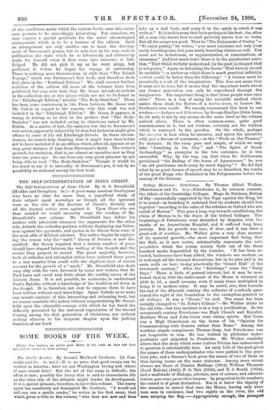THE SELF-INTERPRETATION OF JESUS CHRIST.
The Self-Interpretation of Jesus Christ. By G. S. Streatfeild. (Hodder and Stoughton. 5s.)—A good many amateur theologians who have no time for more than a superficial study of their subject speak nowadays as though all the ignorant were on the side of the doctrine of Christ's divinity and all the learned critics were against it. Upon those who are thus minded we would earnestly urge the reading of Mr. Streatfeild's new volume. Mr. Streatfeild lays before his readers with admirable clearness the arguments for the other side, defends the orthodox position without displaying any bitter- ness against his opponents, and quotes in its favour from some of the most able of Biblical scholars. The author begins by explain- ing the reason why the "myth" theory of Strauss is now dis- credited. His theory required that a certain number of years should have elapsed between the writing of the Gospels and the events they purport to record. The great majority, however, both of orthodox and rationalist critics have reduced these years to a less number than could with the slightest show of reason account for the growth of a "myth." Mr. Streatfeild also deals very ably with the view, favoured by many new writers, that St. Paul knew and cared very little about the earthly career of the historic Jesus. It is not possible, he maintains, to understand Paul's Epistles without a knowledge of the tradition set down in the Gospel. It is, therefore, not easy to suppose them to have been written without such knowledge. Space forbids us to make any minute analysis of this interesting and informing book, but we cannot conclude this notice without congratulating Mr. Street- feud upon the admirable courage with which he has faced the difficulty presented by the universal expectation of the Second Coming among the first generation of Christians, nor without making allusion to his eloquent chapter upon the judicial function of our Lord.














































 Previous page
Previous page